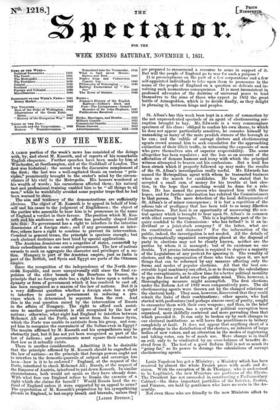NEWS OF THE WEEK.
A LARGE portion of the week's news has consisted of the doings with, by, and about M. Kossuth, and of reports of his remarkable
English eloquence. Further speeches have been made by him at Winchester, at Southampton, and at the Guildhall of London. The -first was historical ; the second was the discursive complement of the first ; the last was a well-cogitated thesis on various " prin-
-ciples," prominently brought to the orator's mind by the circum- stances of his visit to the Metropolis. His hearers wondered at
his wealth of words ; his earnestness affected them ; his natural tact and professional training enabled him to be " all things to all -men," while he watchfully avoided some popular traps that he had been warned to shun.
The aim and tendency of the demonstrations are sufficiently _obvious. The object of M. Kossuth is to appeal in behalf of him- -self and his cause to the judgment of Englishmen ; the object of the parties who assemble to hear him is to pronounce in the name of England a verdict in their favour. The position which M. Kos- Zuth and his audiences seek to affirm has gradually shaped itself into this : No government has a right to interfere in the intestine 'dissensions of a foreign state ; and if any government so inter- fere, others have a right to combine to prevent its intervention. -Couched in general terms, the principle is specious enough ; but such abstract doctrines are best tried by special applications.
The Austrian dominions are a congeries of states, conneetea by their subordination to one central government. The law of nations awards to such an aggregate the character and privileges of a na- tion. Hungary. is part of the Austrian empire, just as India is part of the British, and Syria and Egypt are parts of the Ottoman empire.
Since the recognition of the independence of the North Ame- rican Republic, and more unequivocally still since the final ex- pulsion of the elder branch of the Bourbons in France, the principle that no foreign state has a right to force upon a nation a dynasty or form of government which it has resolved to cast off, has been recognized as a maxim of the law of nations. But it is a very different question whether a foreign state has a right to interfere to assist a government in reducing a pro- vince which is determined to separate from the rest. And this is the real question raised by the intervention of Russia in the affairs of Hungary. The right to afford such assist- ance to another government is 611 recognized by the law of nations ; otherwise, what right had England to interfere between Mehemet All and the Porte, and wrest from the former Syria, which the Porte was unable to extricate from his grasp, and com- pel him to recognize the suzerainete of the Sultan even in Egypt ? The maxim affirmed by M. Kossuth and his sympathizers may be abstractly just, but it has not yet been recognized as part of the law of nations ; and governments must square their conduct to that law as it actually exists. There is another consideration. Admitting it to be desirable that the principle affirmed by M. Kossuth should be engrafted on the law of nations—as the principle that foreign powers ought not to interfere in the domestic quarrels of subject and sovereign has been—how is it to be enforced ? England, at the request of the Porte, interfered to check Mehemet Ali; Russia, at the request of the Emperor of Austria, interfered to put. down Kossuth. In similar Circumstances, both would act again as they have already done. With what face can England refuse to Russia the exercise of a right which she claims for herself ? Would Russia heed the re- fusal of England unless it were supported by an appeal to arms? The approbation of M. Kossuth's proposition by his sympathizing friends in England, is but empty breath and bravado, unless they
are prepared to recommend a recourse to arms in support of it. But will the people of England go to war for such a purpose P
It is presumptuous on the part of a few corporations and a few self-appointed individuals to take upon them to pronounce in the name of the people of England on, a question so delicate and in- volving such momentous consequences. It is most inconsistent in professed advocates of the doctrine of universal peace to lend themselves to the aims of those who expect in 1852 the battle of Armageddon, which is to decide finally, as theyde ht in phrasing it, between kings and peoples.


























